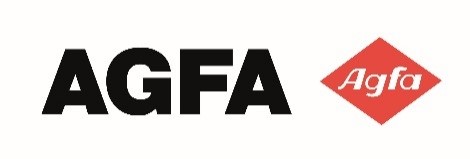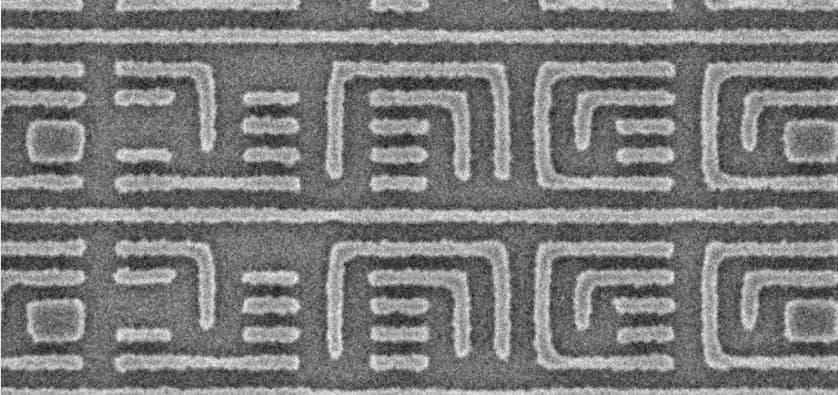
Press release
First-time Demonstration of a Plastic 12-bit RFID Tag and Read-out System with Screen-Printed Antenna
LEUVEN, June 6, 2017 – Quad Industries, Agfa, imec and TNO announced today that they have demonstrated a plastic 12-bit RFID tag and read-out system with screen-printed circuitry. The system integrates, for the first time, a screen-printed antenna and printed touch-based user interface, allowing implementation of the reader on curved surfaces. The demonstrator has been designed for badge security applications, but holds promises for many other applications, including smart packages, wearables and interactive games.
RFID tags made of plastics electronics offer specific advantages over silicon (Si)-based identification devices. They can be affixed to curved packaging, incorporated seamlessly in every-day objects and accommodate inexpensive manufacturing. Typical applications include item-level identification, smart food packaging, brand protection and badge security. RFID tags need to be scanned by a dedicated RFID reader which is typically within two centimeters of the tag. To fully exploit the benefits of plastic electronics, the antenna in both the tag and the reader should be flexible as well. Screen-printed antennas have already been successfully implemented on top of RFID tags, but the read-out systems typically use rigid PCB-based antennas. This is mainly due to a poor resistance and Q-factor of the printed antenna.
Imec, Quad Industries and Agfa have, for the first time, integrated a screen-printed antenna in both the RFID tag and the read-out system. This allows for an optimal integration of both devices on a variety of surfaces. The antennas have been screen-printed by Quad Industries, using printing inks from Agfa.
The partners have demonstrated the new technology in a badge security application. The access badge combines the credit-card size printed antenna with a plastic 12-bit RFID chip, integrated on a flexible plastic substrate. The RFID tag is manufactured in imec’s metal-oxide thin-film transistor (TFT) technology. This technology uses large-area manufacturing processes that allow for inexpensive production in large quantities. The 12-bit RFID developed for this demonstration contains 438 TFTs.
The read-out system contains innovative printed functionality at different levels. Firstly, an RFID read-out antenna is screen-printed on a plastic film, allowing optimal integration on flat, curved or even 3D shaped reader surfaces. Secondly, between the cover lens and the display, a fully printed touchscreen interface with numerical keypad has been added to allow users without a badge to access the building by entering a numerical code. The printed touchscreen was printed using highly transparent screen-printed inks.
“Newly developed nanoparticle based Ag inks allow to achieve much lower resistances over conventional Ag-flake based inks enabling to directly integrate new functionalities by screen printing” stated Wim Christiaens, R&D director at Quad Industries. “Moreover the antenna is printed at the same level of the printed touch screen resulting in direct, more cost effective integration of both the printed antenna and the customized touch screen in the reader device.”
“This printed example shows how Orgacon® nanoparticle based silver inks open new possibilities in the market of Internet-of-Things where the highest silver efficiency, ultra-fine conductive circuitry, and a wide substrate choice can bring costs down” said Guido Desie, R&D manager at Agfa.
“This demonstration is a noteworthy example of hybrid flexible electronics, combining the advantages of plastic electronics with metal-oxide TFT technology developed by imec and TNO” commented Kris Myny, principal member of the technical staff at imec. “The technology allows for low-cost screen-printing manufacturing, is easily customizable and eco-friendly, and enables direct chip integration on various substrates including plastics, paper and more. The technology promises applications in smart packaging, smart gaming and smart PCB.”
The prototype system is demonstrated at the SIM User Forum in Antwerp, Belgium. The work on printed conductive structures is carried out as part of the Flemish Met@link project. The work on transparent touch screens is carried out by Quad Industries under the framework of the European project INREP which received funding from the European Union’s Horizon 2020 research and innovation programme under grant agreement n° 641864. The work on flexible RFID technologies is performed in Holst Centre, an open innovation initiative set up by imec and TNO.
About imec
Imec is the world-leading research and innovation hub in nano-electronics and digital technologies. The combination of our widely acclaimed leadership in microchip technology and profound software and ICT expertise is what makes us unique. By leveraging our world-class infrastructure and local and global ecosystem of partners across a multitude of industries, we create groundbreaking innovation in application domains such as healthcare, smart cities and mobility, logistics and manufacturing, and energy.
As a trusted partner for companies, start-ups and universities we bring together close to 3,500 brilliant minds from over 75 nationalities. Imec is headquartered in Leuven, Belgium and also has distributed R&D groups at a number of Flemish universities, in the Netherlands, Taiwan, USA, China, and offices in India and Japan. In 2016, imec's revenue (P&L) totaled 496 million euro. Further information on imec can be found at www.imec.be.
Imec is a registered trademark for the activities of IMEC International (a legal entity set up under Belgian law as a "stichting van openbaar nut”), imec Belgium (IMEC vzw supported by the Flemish Government), imec the Netherlands (Stichting IMEC Nederland, part of Holst Centre which is supported by the Dutch Government), imec Taiwan (IMEC Taiwan Co.) and imec China (IMEC Microelectronics (Shanghai) Co. Ltd.) and imec India (Imec India Private Limited), imec Florida (IMEC USA nanoelectronics design center).
Contact:
Hanne Degans, Press Officer, +32 16 28 17 69 // +32 486 06 51 75 // Hanne.Degans@imec.be
About Quad Industries
Quad Industries specialises in user interfacing and printed electronics. We supply a broad range of touch and switch solutions, such as capacitive touch keys, haptic touch, membrane switches, PCAP solutions, and force sensing. Quad Industries is a leading innovator in printed electronics. By means of highly accurate screen-printing techniques we create smart labels on various substrates such as flexible films, textiles and paper. Our hybrid flexible electronics platform enables the combination of printing circuitry, NFC antenna's, batteries and sensors with automatic component assembly to create a broad range of smart labels and tags.
Contact:
Wim Christiaens, R&D director // Wim.Christiaens@quad-ind.com
About Agfa
The Agfa-Gevaert Group develops, manufactures and distributes an extensive range of analogue and digital imaging systems and IT solutions, mainly for the printing industry and the healthcare sector, as well as for specific industrial applications. The Group’s operational activities are divided in three independent business groups, Agfa Graphics, Agfa HealthCare and Agfa Specialty Products. All business groups have strong market positions, well-defined strategies and full responsibilities, authority and accountability. Agfa Specialty Products serves the Printed Electronics market with high performance conductive inks for screenprint-, flexo- and ink jet applications.
Agfa’s headquarters and parent company are located in Mortsel, Belgium. The Agfa-Gevaert Group has production facilities around the world, with the largest production and research centers in Belgium, the United States, Canada, Germany, France, China and Brazil. The company is commercially active worldwide through wholly owned sales organizations in more than 40 countries. In countries where the company does not have its own sales organization, the market is served by a network of agents and representatives.
The Agfa-Gevaert Group achieved a turnover of 2,537 million euro in 2016.
Contact:
Viviane Dictus, Director Corporate Communications, +32 3 444 7124 // viviane.dictus@agfa.com


Published on:
6 June 2017











